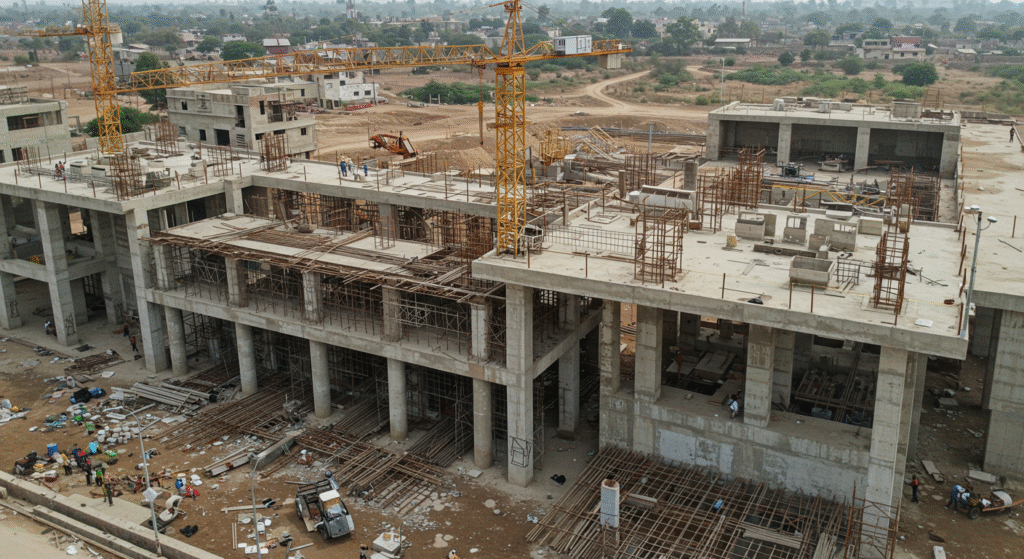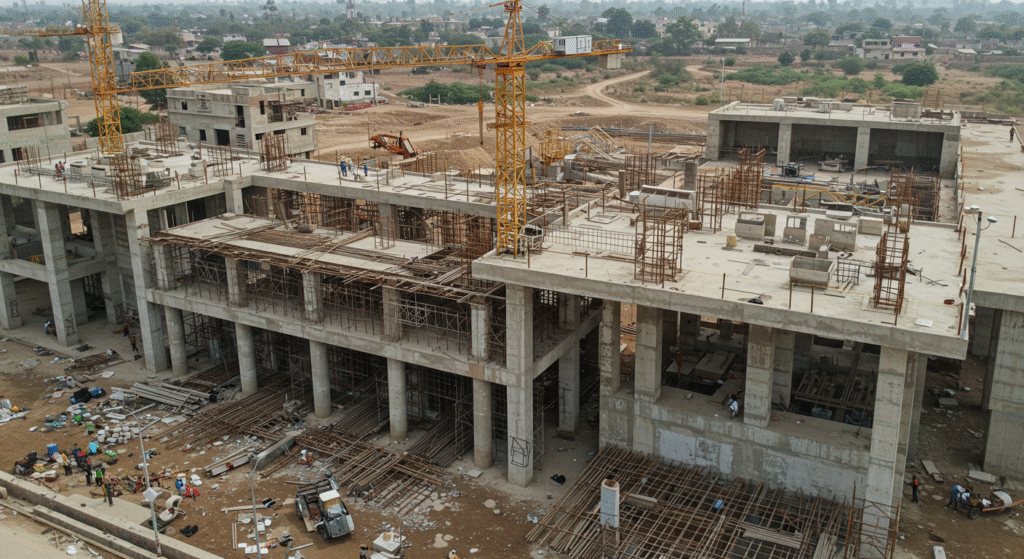
Introduction
Civil Engineering stands as one of the oldest and most important branches of engineering, shaping the physical world around us. A B.Tech in Civil Engineering is a prestigious undergraduate program that equips students with the knowledge and skills required to design, construct, and maintain infrastructure projects such as bridges, roads, dams, buildings, and water systems. This discipline plays a pivotal role in urban planning, environmental sustainability, and the development of both modern and traditional infrastructure.
In this article, we will dive deep into the B.Tech in Civil Engineering program, its course structure, career opportunities, salary expectations, and the future of this dynamic field.

















What is B.Tech in Civil Engineering?
B.Tech in Civil Engineering is a four-year undergraduate degree program that focuses on the design, construction, and maintenance of the built environment. Civil engineers work on projects that contribute significantly to the economic development of society by developing infrastructure.
This program covers a broad range of topics including structural analysis, material science, fluid mechanics, geotechnical engineering, transportation engineering, and environmental engineering. The curriculum is designed to give students a comprehensive understanding of both theoretical concepts and practical skills, preparing them for various roles in the civil engineering industry
Why Choose B.Tech in Civil Engineering?
Choosing Civil Engineering as a career comes with a multitude of benefits and opportunities:
1. Growing Demand for Infrastructure Development
The increasing need for infrastructure development globally, including transportation, housing, and sustainable water systems, has significantly boosted the demand for civil engineers. This trend is expected to continue as developing countries invest in modernization projects.
2. Lucrative Career Opportunities
With a degree in Civil Engineering, graduates can expect high-paying jobs in various industries such as construction, transportation, environmental engineering, urban development, and government projects.
3. Contribution to Society
Civil engineers contribute significantly to society by building infrastructure that improves quality of life. From designing bridges that improve connectivity to creating sustainable buildings, civil engineers make lasting impacts.
4. Diverse Specializations
Civil Engineering offers several specializations like Structural Engineering, Environmental Engineering, Geotechnical Engineering, Water Resources Engineering, and Transportation Engineering, allowing students to choose a niche that aligns with their interests.
5. Global Opportunities
The skills learned in B.Tech Civil Engineering are transferable globally. Graduates can find opportunities in multinational companies, government agencies, and private firms, working on large-scale international projects.
Course Structure of B.Tech in Civil Engineering
B.Tech in Civil Engineering typically spans four years and is divided into eight semesters. The course structure varies slightly depending on the university or institute, but the core subjects remain consistent across most programs.
Year 1: Foundation in Basic Engineering and Science
In the first year, students are introduced to basic engineering principles and sciences. The emphasis is on building a strong foundation in subjects that are crucial for understanding civil engineering principles.
Core Subjects:
● Mathematics I & II
● Physics
● Chemistry
● Engineering Mechanics
● Electrical and Electronics Engineering
● Basic Computer Science
● Introduction to Civil Engineering
● Engineering Drawing
Year 2: Building on Core Civil Engineering Concepts
In the second year, students dive into the core aspects of civil engineering, focusing on understanding the behavior of materials, structures, and systems.
Core Subjects:
● Strength of Materials
● Structural Analysis I
● Fluid Mechanics
● Surveying
● Geotechnical Engineering
● Materials Science
● Building Construction and Technology
● Environmental Engineering
Year 3: Advanced Topics in Civil Engineering
In the third year, the course dives deeper into more advanced topics, and students begin to choose electives based on their area of interest.
Core Subjects:
● Structural Analysis II
● Concrete Technology
● Transportation Engineering
● Water Resources Engineering
● Environmental Management
● Geotechnical Engineering II
● Hydrology
● Construction Management
Year 4: Specializations and Project Work
The final year focuses on refining the skills required for a specific area of civil engineering. Students also work on projects that demonstrate their ability to apply their knowledge to real-world problems.
Core Subjects:
● Advanced Structural Analysis
● Earthquake Engineering
● Traffic Engineering
● Foundation Engineering
● Design of Concrete Structures
● Design of Steel Structures
● Project Work/Dissertation
● Elective Subjects (depending on specialization)
Specializations in Civil Engineering
In the fourth year, students can opt for one or more specializations in various
fields of civil engineering, such as:
● Structural Engineering
● Environmental Engineering
● Geotechnical Engineering
● Transportation Engineering
● Water Resources Engineering

















Key Skills Developed in B.Tech Civil Engineering
Throughout the course, B.Tech Civil Engineering students develop a wide array of technical and soft skills that are essential for success in the field.
1. Analytical Skills
The ability to analyze complex problems, use engineering principles to design solutions, and predict outcomes is key to civil engineering.
2. Problem-Solving
Civil engineers are often presented with challenges related to the construction and maintenance of structures. Critical thinking and problem-solving skills are crucial to finding effective solutions.
3. Project Management
From planning to execution, civil engineers are responsible for managing large-scale construction projects. Students learn how to manage budgets, timelines, and resources efficiently.
4. Communication Skills
Effective communication is essential when working in teams or interacting with clients, contractors, and regulatory bodies.
5. Technical Expertise
Civil engineers gain expertise in using specialized software such as AutoCAD, STAAD Pro, and other design and simulation tools.
Career Opportunities After B.Tech in Civil Engineering
A B.Tech in Civil Engineering opens up a wide range of career opportunities across various industries. Civil engineers can work in government and private sectors, specializing in different aspects of civil engineering.
1. Construction Manager
Construction managers oversee construction projects, ensuring that they are completed on time, within budget, and according to safety standards.
2. Structural Engineer
Structural engineers design, analyze, and ensure the integrity of structures such as buildings, bridges, and dams.
3. Geotechnical Engineer
Geotechnical engineers study soil, rock, and groundwater conditions to design safe foundations and structures.
4. Transportation Engineer
Transportation engineers focus on designing, planning, and managing transportation systems such as roads, highways, railways, and airports.
5. Environmental Engineer
Environmental engineers focus on sustainability, waste management, and water treatment projects aimed at improving environmental health.
6. Urban Planner
Urban planners design and develop infrastructure projects related to city planning, including roads, utilities, and community services.
7. Project Engineer
Project engineers are responsible for the technical management of specific engineering projects, ensuring everything from resources to timelines is managed effectively.
8. Academia and Research
For those inclined toward teaching and research, pursuing higher education (M.Tech or Ph.D.) can lead to careers in academia or research institutions.
Salary Expectations for Civil Engineers
Civil Engineering offers a lucrative career path, with salary packages varying depending on factors like experience, job role, and industry.
| Job Role | Average Salary (INR) |
|---|---|
| Construction Manager | ₹7–15 LPA |
| Structural Engineer | ₹6–12 LPA |
| Geotechnical Engineer | ₹6–12 LPA |
| Transportation Engineer | ₹6–10 LPA |
| Environmental Engineer | ₹5–10 LPA |
| Urban Planner | ₹5–8 LPA |
| Project Engineer | ₹6–10 LPA |
💡 Note: Graduates from premier institutes like IITs, NITs, or BITS Pilani may command higher salary packages, especially in multinational companies or government agencies.
Top Colleges for B.Tech in Civil Engineering
Selecting a reputable college is crucial for obtaining quality education and good job placement opportunities. Here are some top institutions offering B.Tech in Civil Engineering:
In India:
● Indian Institutes of Technology (IITs) – Delhi, Bombay, Madras, Kanpur
● National Institutes of Technology (NITs) – Trichy, Surathkal, Warangal
● Birla Institute of Technology and Science (BITS) Pilani
● Indian Institute of Engineering Science and Technology (IIEST) Shibpur
● VIT University – VIT Vellore
Globally:
● Massachusetts Institute of Technology (MIT), USA
● Stanford University, USA
● University of Cambridge, UK
● ETH Zurich, Switzerland
● University of California, Berkeley, USA
These institutions are renowned for their rigorous academic programs, excellent faculty, and strong industry connections.

















Future Trends in Civil Engineering
Civil Engineering is evolving rapidly due to advancements in technology, environmental concerns, and sustainable development. Some key trends include:
1. Sustainable Infrastructure
With growing concerns over climate change, civil engineers are focusing on building energy-efficient, eco-friendly, and sustainable infrastructure projects.
2. Smart Cities
The development of smart cities is revolutionizing urban planning and infrastructure, integrating technology with design and construction for more efficient, automated urban systems.
3. Construction Automation
The rise of automation in construction, including 3D printing and robotic construction, is transforming how civil engineers approach building projects.
4. Green Building Technologies
Green buildings, powered by renewable energy and designed with sustainable materials, are becoming a major focus in the construction industry.
5. Drones and Remote Sensing
Drones and satellite imagery are increasingly used for surveying land, monitoring construction progress, and assessing building conditions.
Conclusion
A B.Tech in Civil Engineering is a gateway to a rewarding career that directly impacts society’s growth and development. From designing world-class infrastructure to contributing to environmental sustainability, civil engineers play a crucial role in shaping our world.
With diverse career opportunities, attractive salaries, and the chance to specialize in various areas of civil engineering, this degree provides excellent professional growth. For those passionate about infrastructure, problem-solving, and sustainable development, pursuing a B.Tech in Civil Engineering is an ideal choice.
























